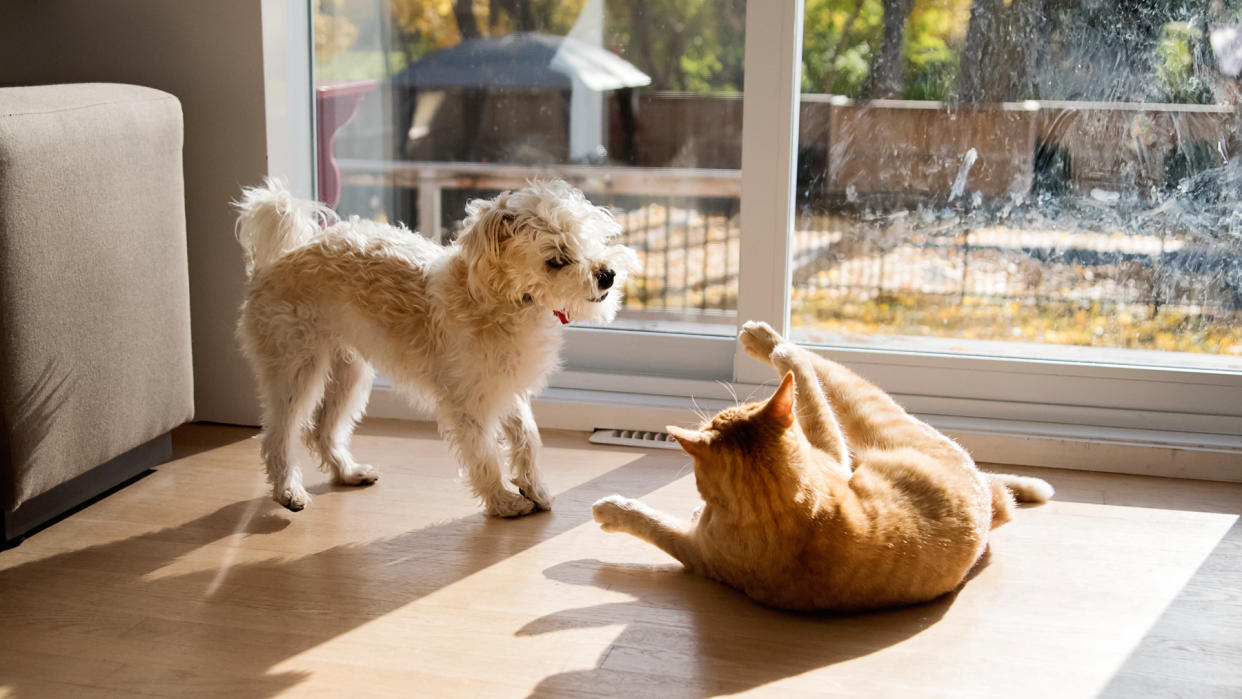Should I get a cat or dog?

Should I get a cat or dog is a highly asked question. We often think of ourselves as being either ‘cat people’ or ‘dog people’, but sometimes it’s not that simple. Maybe you grew up with cats but always wanted a dog, or you consider yourself a dog person but you love cats too – or vice-versa.
If you’re thinking of welcoming a new pet, and you’re open to both cats and dogs, you might be wondering which is best for you and your household so you know whether you’ll be stocking up on the very best puppy toys or working out which is the best kitten food in the coming months.
It can be tricky to know which animal go to for, and there’s no right or wrong answer. But, some animals are better suited to certain environments and household dynamics than others, as we’ll look at in more detail here.
Consider your own personality
“Dogs and cats are very different animal species, and consequently have very different needs,” explains Dr. Anna Foreman, vet at Everypaw. “With regard to personality, some people prefer the independence of a cat, and some the more friendly loving nature of a dog. However, both species can have varying characteristics depending on their nurture, particularly before 16 weeks of age.”
And, of course, even within the same species, breeds can be significantly different. For example, low maintenance dog breeds are more likely to display the independent, personalities we associate more with cats. In contrast, some of the most affectionate cat breeds can often surprise people with their warmth and neediness often linked to dogs. Meanwhile, animals who’ve previously been abused or have lived on the street might find it harder to adapt to a home environment.
Which animal fits best with your lifestyle?
Think about your lifestyle. You can leave cats home alone for longer, and you might install one of the best microchip cat flaps so they can go inside and outside as they please. So, even if everyone is out all day at work and school – or you’re off on a day trip at the weekend – there’s less likely to be any issues.
In contrast, dogs shouldn’t be left alone as long as cats – Dr. Foreman recommends not leaving dogs home alone for longer than four hours, as they require frequent socialization, and toilet breaks too. She continues, “Dogs who are left alone for extended periods of time are prone to developing abnormal behaviors due to boredom and loneliness. Equally, if a dog who is always with their owner then is left alone, no matter for how long, they can develop separation anxiety.”
And dogs need frequent walking, too – at least once a day. Outdoor cats in particular can regulate exercise themselves, but even if your dog has garden access, they’ll need a daily walk.
It’s also important to consider how busy your home is. If you have a large family, frequent visitors, and other pets, it might not be the best environment for a cat – if they have outdoor access, they could even leave and find a home elsewhere.
And while a dog may be better suited to more hectic environments than cats, some dogs do prefer a more relaxed home – and as dogs are more demanding than cats, some busy households might not actually have time to meet all of their needs properly. But, generally, dogs are more likely to suit a busy household with children.
And, as Dr. Foreman points out, “Some dogs can be exceptionally anxious, and some cats extremely outgoing!”.
Don’t forget about your finances
Of course, your financial situation needs to be considered when you’re looking at bringing home a new cat or dog. While neither are cheap, cats tend to be cheaper than dogs to care for, and smaller dogs tend to be cheaper than larger dogs.
Generally, smaller animals cost less to feed, and it’s the same when it comes to veterinary care too – larger animals usually need larger doses of drugs. Not only that, but cat insurance is usually cheaper than dog insurance too.
“However, says Dr. Foreman, “Cats tend to have a longer life expectancy of 15-20 years than dogs, whose life expectancy can range from 6-15 years depending on breed, and so although they can be cheaper on a year-by-year basis, over the course of their lifetime an owner may end up spending significantly more money on a cat”.
But, again, it’s important to remember that any dog or cat can be expensive. Dr. Foreman discusses the cost of food, veterinary care, accessories, and travel – these should all be considered.

Have you got a cat or dog already?
If you’ve already got a cat or dog at home and you want to add another four-legged friend, what’s the best option?
It comes down to the individual animals. Dr. Foreman discusses her own cat, who grew up with her dogs from the age of six weeks old, and “now thinks he’s a dog”, and explains that dogs and cats living together can certainly get on well in some circumstances.
“However,” she continues, “Some dogs (such as sighthounds) have a high prey drive and will tend to chase/hunt cats, with this behavior being difficult to train out of them. Equally, some cats can hate dogs and find living with them extremely stressful, leading to some quite serious medical issues.
It is easier for an existing dog or cat to accept a puppy or kitten than an adult animal, as they can establish a hierarchy more readily, and the puppy or kitten can grow up around the adult during the pre-16 week learning phase and so adapt their behaviors more readily. When older, an animal may be more adverse to change.”
Ultimately, all animals are different, and there’s no one-size-fits-all advice. While cats and dogs are different, there are so many differences in terms of breeds and even individual animals that your new pet might not react or behave quite as you expect.
But, as a rough guide, dogs are better suited to busier households where people (including children) are around more often, while cats are more comfortable being left alone, and are a little more low-maintenance.
If you’re swaying towards one species or the other, why not take a look at the different breeds or visit a local rescue?